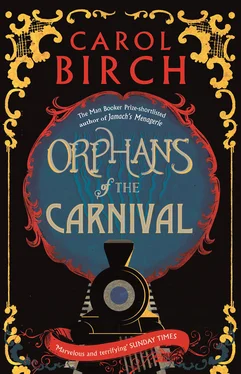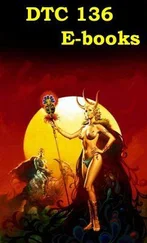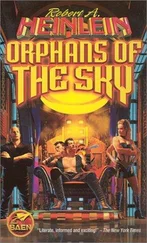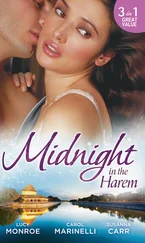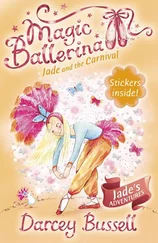— dmission — doors ope—
‘That’s admission, doors open.’
— allery, Regent Stre—
— ndon—
Then one whole word: Culiacán.
‘Culiacán,’ said Rose.
‘It’s in Mexico,’ said Adam.

Flowers were heaped everywhere in the dressing room. Every show there were flowers, that’s how it was now. They’d given Paris a miss and gone straight to Berlin. Germany loved her, and suddenly life was fast and bright and swept her along — theatres, gold brocade, lights, the face of a crowd, hands touching hers, hands that stroked shyly, as if she was very rare and very wild.
When it came to being stared at, Julia was an expert. She could handle them all, the Rapt Bedazzled, the Eyestalk Gawker, the Holy Seeker, the Furious Affronted, the Scared, the Nauseous, the Shyly or Archly Flirtatious, and — most rare — the Frank Equal. Theo was a Rapt Bedazzled but now he was also turning into a Used-To-Me, like the people back home. For so long now her face had been a fascination, a honey for looks. They flew towards her like darting insects, flew away, returned, irresistibly drawn. But she knew what to do. Meet. Read. Drop or hold. Release. Don’t challenge unless challenged. Drag them away from the mouth, the whiskers, the breasts, into the eyes, and sometimes smile. You know when. You always know. If they shout, laugh, shoot hate — look away, resist. Pretend.
But never yet, after all the shows, the little towns in England, the rainy villages, the big city stages, the lowlands of Holland when the rain never stopped; after all the stares of all the people in all those places and all that went before on the far side of the sea — never once had she been more scared than when standing on this balcony, looking through her veil at the obscure mass of faces. Something was different. The crowd was rowdy. She had to act, speak a language she didn’t know, remember the cues. Her heart was beating too fast.
It seemed as if the entire city of Leipzig had turned out.
Der Curierte Meyer!
For the first time ever, after her triumphs in America and England, the Remarkable Miss Julia Pastrana in a play written specially for her.
Der Curierte Meyer — The Milkman Cured
It wasn’t a real play. It was a musical comedy, a silly little piece, but Theo was right — it pulled them in, the high and the low, and the place was bursting at the seams. German wasn’t one of her languages, but she’d learned the lines specially and knew the cues. It was really just her doing her usual songs and dances, with a few lines she had to say here and there, no long speeches or anything like that—
It didn’t feel right.
Those men. She’d heard them laughing.
Well, it was a funny play.
Better they laugh than be afraid.
When the curtain rose, a hush fell. A drum rolled.
Stage left, paper roses hung over a wall. A rustic seat by a fountain. Stage right, a garlanded balcony, on which she stood sweating under the veil. A single violin played a sweet rising air, and she ran lightly down the steps as the rest of the strings and the woodwinds came in, danced as the music swelled. If it were just the dancing, her arabesque, her plié, she could do that. Or the songs, but laughter was a different thing. She wore white flowers in her hair. She’d rubbed the love potion into her arms and shoulders. Her gris-gris bag was in a secret pocket. Smiling in expectation, the audience settled in. As the dance drew to a close, voices were heard, stage left. She ran back up the steps, white mesh, tiny white slippers, the dress bouncing and frothing around her in dusty pink and gold layers, and sat down at a small table on the balcony, taking up a large fan with gold and red tassels. Two young men entered below and began speaking in loud braying voices. One was tall and handsome, the other shorter and slightly plump, both with a dandyish air. She couldn’t understand a word they said but knew they were talking about their friend Stefan, a fool of a milkman who falls in love as easily as he falls asleep.
But wait! Who is that on the balcony!
She rises, taking up her fan.
Why, she is the remarkable Fraulein Lieselotte. In her own country she is considered a great beauty!
So graceful!
Fraulein Lieselotte! Dear lady!
Down she comes.
Up and down in the footlights, skirts swinging, one small gloved hand idling with the fan, she saunters around the stage. They dart playfully before and behind her like circling bees, calling to one another and to her in ridiculous tones, words that draw bursts of expectant laughter and a few whoops from the audience, vying with each other to praise her pretty foot, her figure, her elegance, begging her to please, for just one moment, please, dearest lady, lift up your veil .
She waits for the piccolo, and when its plaintive sound rises up from the pit, she stands still, turning fully to face the audience.
For the thousandth time, the reveal.
A great sighing groan of wonder rises from the audience. Same as ever, but the joke’s on those two silly men, now following her as she walks, always keeping her back to them and her face to the crowd. The fat one falls over. Laughter pools like smoke in the domed ceiling. She shares a smile with the crowd. We are in this together, it says. When the horns and the drum blare and she turns on the men, there are screams and disbelieving laughter. She’s impossible. My God! My God ! To be that.
The young men, poor actors, step back, open-mouthed. Julia’s heart hammers madly. She smiles and they scream some more. She parades, the piccolo playing, up and down the front of the stage with her skirts seductively swaying. Something in this new laughter, a braying quality, an imp of misrule, an ugliness to square up against her own. She feels as if she’s in a pit. The uglier the air, the more gracefully she moves, a sweeping implacable presence chasing them across the stage with her face, driving them to the wall, where they stand knock-kneed and quaking, biting their nails.
She turns from them scornfully, walks centre stage and speaks. ‘You see,’ she says, raking the audience with her eyes, ‘the poor creatures are struck dumb by my beauty.’
An explosion. A howling and thumping of feet on the floor. Now the dance, while they’re going mad. Slay them. Laugh, dance with the fan, let it draw circles on the air. The more they scream the bigger the show. She throws up her big proud head with its massive crown of hair and flowers, flexes her shoulders and twitches her hips, lets drop the shawl so that the dark groomed thatch of her arms and shoulders appears, and the smooth down of heavy breasts in a low-cut dress.
A bell rings. The dance ends. With a flourish, she takes up her shawl and retreats to the balcony, seating herself elegantly and composing the thick veil before her face, while the two men gabble below: She is quite hideous! And yet and yet…
Theo, in the wings, smiles warmly at her. It’s going well. Some knockabout stuff occurs on stage. The two young men are joined by their friend Stefan, the stupidest thing ever, a clod of a dairyman with baggy breeches and an anxious whining voice. They tease and twit him. Gusts of laughter roll in from the audience as he falls headfirst into the orchestra pit and has to be pulled out by the legs.
But wait! Who is she?
The lights dim and a hush falls. She sings into the silence:
… Leise flehen meine Lieder …
Stefan falls in love on the instant, just with her voice and veiled form. She descends to the rustic seat by the fountain, and his friends abandon him, sniggering behind their hands. Confused, he whirls around.
Читать дальше
